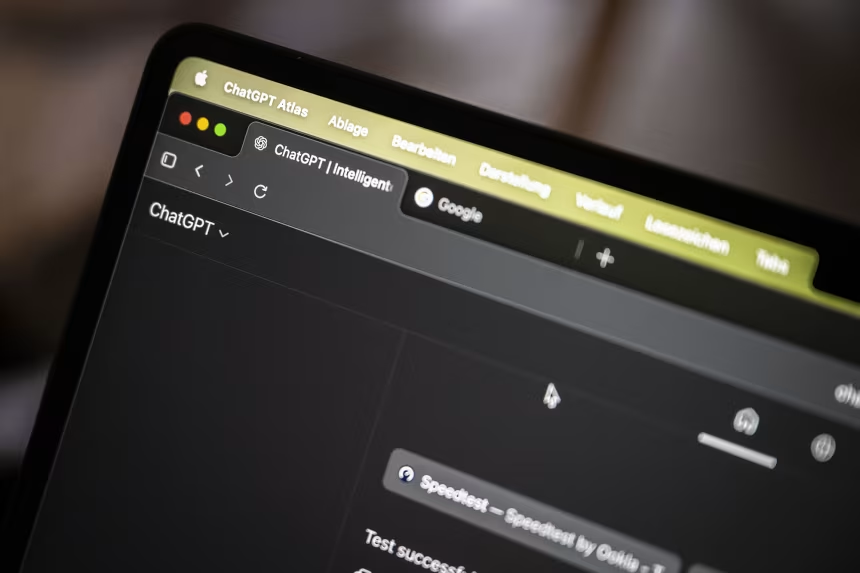In a bold move that could reshape how people experience the internet, OpenAI has unveiled ChatGPT Atlas — a desktop web browser infused with the company’s powerful AI assistant. The launch signals a direct challenge to Google’s long-standing dominance in the world of search and web navigation. For more than two decades, Google has served as the world’s front door to the internet. Now, OpenAI is betting that AI can become that gateway instead.
OpenAI’s new browser isn’t just another way to access ChatGPT, which already boasts more than 800 million weekly users. It’s an attempt to integrate the chatbot into every corner of online life — from browsing news and social media to shopping, planning trips, or managing tasks. The company envisions a future where the AI assistant doesn’t just answer questions but actively helps users accomplish their goals within the browser itself.
A Browser Built Around Intelligence
“Your browser is where all of your work, tools, and context come together,” OpenAI CEO Sam Altman wrote in the company’s announcement. “A browser built with ChatGPT takes us closer to a true super-assistant that understands your world and helps you achieve your goals.”
Unlike traditional browsers, Atlas puts ChatGPT at the center of the user experience from the moment you open it. Instead of Google’s familiar search bar, users are greeted by ChatGPT’s prompt box — ready to help with queries, research topics, or handle specific tasks. There’s also a built-in sidebar where users can ask ChatGPT to summarize web pages, explain unfamiliar terms, or even perform follow-up actions.
For instance, by simply highlighting text in an article and typing “What’s this?”, ChatGPT can explain a term such as “adjusted earnings.” The browser’s Agent Mode goes a step further, enabling ChatGPT to act on a user’s behalf — booking restaurant reservations, finding local services, or helping organize trips. One demonstration showed ChatGPT locating a bar in New York City’s Long Island City neighborhood with affordable drinks near the subway and offering to make a reservation directly.
Google’s Empire Faces a Real Competitor
While OpenAI’s Atlas is just getting started, its ambition puts it in direct competition with Google’s Chrome, which currently commands nearly 72% of global web traffic, according to Statcounter Global Stats.
Google has been preparing for this kind of competition for years. Its Gemini AI assistant is already integrated into Chrome, providing webpage summaries, contextual answers, and task automation. Google Search has also introduced AI-generated summaries at the top of search results, reducing the need for users to click traditional links — a shift supported by data from Pew Research showing that users are less likely to click on links when AI summaries are present.
However, OpenAI’s timing couldn’t be more strategic. Industry observers and antitrust experts have been questioning Google’s outsized influence over the web. During the U.S. Justice Department’s landmark antitrust case against the company, one key concern was whether Google’s dominance in search might extend into the next frontier: generative AI.
In a September court filing, Judge Amit Mehta noted that the case was as much about preserving competition among general search engines as it was about preventing Google’s monopoly from carrying over into AI-driven search. That context makes Atlas’ arrival especially significant — it’s a tangible product competing for users’ attention at the intersection of browsing, search, and AI.
A Turning Point for the Internet
The emergence of AI-driven browsers like Atlas — and competitors such as Perplexity’s Comet, launched earlier this year — marks a historic turning point. For decades, internet search revolved around a list of blue links. Now, companies like OpenAI are reimagining the experience as an interactive dialogue, where AI not only retrieves information but helps interpret and act on it.
For everyday users, this could mean less time jumping between tabs and more seamless integration between search, productivity, and creativity. For publishers, advertisers, and SEO professionals, it could mean a massive rethinking of how audiences find and engage with content online.
Apple’s own data hints that this shift may already be underway. In court testimony earlier this year, Apple’s senior vice president of services said that search queries on its devices had declined for the first time in April — a possible sign that users are increasingly turning to AI assistants rather than traditional search engines.
The Bigger Picture
Whether Atlas succeeds in winning over the masses remains to be seen. The browser is only days old, and consumer habits — especially when it comes to web browsing — tend to evolve slowly. Yet its launch underscores OpenAI’s growing ambition to expand beyond text chat and become a central player in how people interact with technology.
From ChatGPT’s initial debut to its integrations with Microsoft’s Office suite, and now with Atlas, OpenAI is clearly positioning itself as the operating layer for the AI-powered internet. The company has also hinted at future expansions into consumer hardware, potentially mirroring Google’s own evolution from a search engine to a tech ecosystem.
If that trajectory sounds familiar, it should — it’s a playbook once perfected by Google itself. But this time, the roles are reversed. With Atlas, OpenAI isn’t just trying to reinvent the browser; it’s challenging the very foundation of how billions of people access the web.
And in doing so, it might just redefine the next chapter of the internet.

